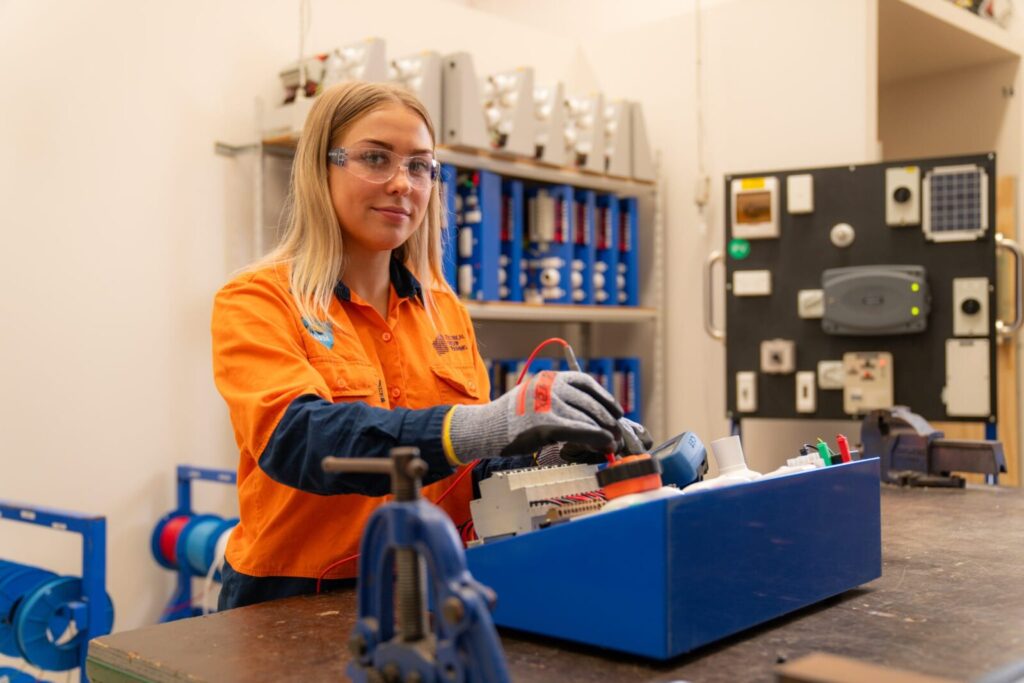21-year-old electrical apprentice Raya Hukin’s career nearly took a very different path. After starting a university degree, Raya knew three months in that her heart - and her skillset - lay with the tools, and she started an electrical apprenticeship instead.
From university degree to an apprenticeship
“I worked in hospitality after I finished school. I always loved being hands on, but I thought I needed to do something different so I did a bridging course to get into uni,” says Raya. “I was training to be a high school sports teacher, but I knew it wasn't for me after three months in.
“I wanted to be working and getting paid while I studied. I waited six months so that I could go back if I didn’t like electrical. But I started it and I knew straight away that going back to uni wasn’t even an option.”

Why become an electrical apprentice?
“I like the idea of problem solving and figuring out how to do something or fix a problem,” Raya says, when asked why becoming an electrician appealed to her.
“I loved maths in school and I like being hands on. I always want to be on my feet, moving around. I don’t even look at the clock when I’m doing a trade. The day just goes so much quicker.”
A day in the life of an electrical apprentice
So what do these days that go by so quickly involve? What are the duties of an electrical apprentice? “It really depends on the job site and the stage it’s at. Usually, I’ll be stripping wires, going under the floors and up into roofs to pull out old wires and put new ones in, lifting up panels, putting new lighting in.
“Some sites are further on, some are at the start but there’s always something to do. You start by sweeping the floors. Everyone says your [electrical] first year apprentice is going to be horrible, that you’re literally sweeping for the first year.
“But I got on the tools in my first week. Everyone helps each other.”
Benefits of being an electrical apprentice
In recent years, the construction industry has made significant progress in encouraging more people into the workforce. Has Raya felt supported by the people around her?
“It’s 100% supportive. It’s not just the companies I work for, CTF is really good at helping out with funding and tools and I know I could go to TAFE if I had any problem. You’re supported in every way.”
Living healthier
As well as supportive team members, there’s been another unexpected side effect of going into the construction industry.
“It’s definitely made me fitter and healthier,” Raya says. “I used to eat quite badly but after my first week, I felt dead. I was like I need a good sleep and I need to eat some protein.
“I didn’t even want to go out on the weekend. It’s tiring so you’ve got to be quite fit!”
Collaboration and support
Raya is emphatic when asked if she would recommend taking up an electrical apprenticeship. “100%,” she says. “You’ve got to give it a go because even if you aren’t the best to start with, there’s always help to give you the skills and support.
Earn good money
“You really just need to be able to focus and enjoy problem solving and doing things hands on. Once I’m qualified, I’ll be on good money. Once I’ve gained experience as a qualified electrician, I want to get my own van and start my own business. By the time I’m ten years down the track, I’ll have people going out in my vans working for me.”
Navigating a pathway into construction
It sounds like Raya has her future all planned out. Is there a part of her that wishes she’d realised what she wanted to do sooner and gone straight into a trade?
“No way. The uni experience 100% helped me because it was the other option. If I hadn’t done that, I might not have known for sure. Because I did try uni, I knew exactly what I wanted to do.”
If you’re interested in a career in construction, contact CTF to learn about pathways into the industry. There are a number of pathways and school-based traineeships available, as well as other routes and financial support.
Last modified on:

